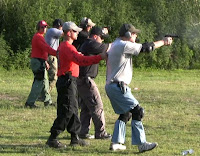What do you practice when you train?
Have you ever fallen on your butt with a loaded gun in your hand while retreating? How did you fall? Where was your trigger finger? Where was your muzzle pointed? What did you do after the fall?
Do you know most never train for likely scenarios, most just shoot at paper while standing still.
Have you ever incorporated verbal challenges, or screams, elbows, kicks and punches to distract in conjunction with retreating?
Have a plan and practice it.... It's not a guarantee of survival in a fight, but the likely hood that you will fend better is more in your favor.
BE ADVISED
The Practices, methods, and techniques described in this Video are not for beginners. ThisVideo is designed for people with background, knowledge, and experience in firearms and firearms handling. If you do not have substantial background, knowledge, and experience with firearms and firearms handling, seek instruction before attempting to utilize or implement the practices, methods, and techniques described in this Video.
Shooting and handling firearms involves inherent and unavoidable risks. Firearms are dangerous. Obviously, serious injury and death can result from firearms use. If you are not willing and able to take responsibility for your actions, do not handle firearms.
Whenever handling a firearm, remove the magazine (if applicable) clear the chamber, and visually inspect to verify that the firearms chamber is not loaded before handling. Cleaning or working on the firearm. Always use appropriate eye and ear protection whenever shooting. Know how to safely operate your firearms or any firearm you handle. Be sure to use only the correct ammunition for the specific firearm. Use correct and functioning target systems only. Not all firearms operate the same. Do not assume that your firearm operates like the ones depicted in this video. Never handle a firearm unless in an appropriate location, such as a shooting range.
SAFETY RULES!
Always treat all firearms as if they were loaded.
Always point a firearm in a safe direction.
Always keep your finger off the trigger until you are ready to fire.
Always know your target, your surroundings, your backstop and beyond.
These primary rules are not exclusive or failsafe in all circumstances. Here are many other rules, policies and procedures that must be implemented and followed to maximize safety and effectiveness, depending on the situation. Some are commonsense; others are technical and situation specific. This Video does not apply to or address all situations or circumstances. This Video is not intended to be a complete or exclusive guide to firearm operation, and it particularly does not purport to give complete instructions with regard to any particular firearm. This Video must be used in conjunction with adequate prior experience and other resources.
SHOOT SAFE!
Stephen Cohen
Tactical U























